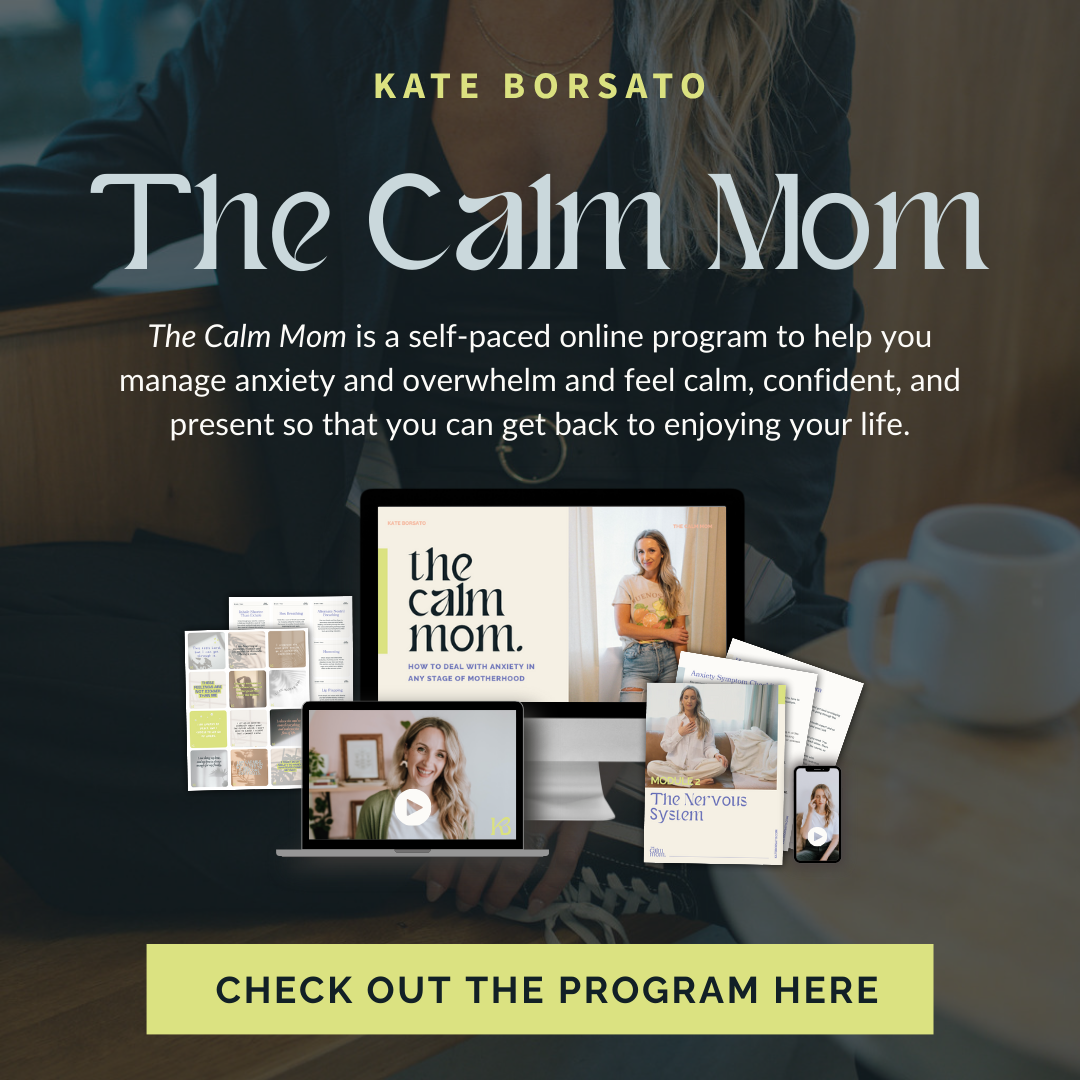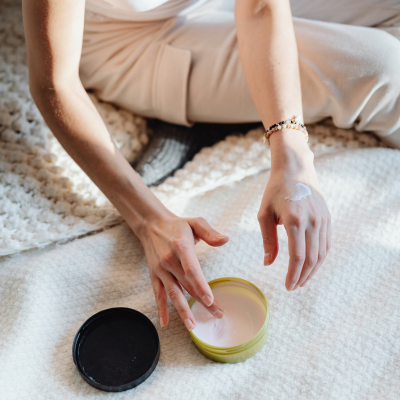One of the most shocking experiences of becoming a mom is the scary thoughts that flash into your mind like a lightning bolt.
“What if I drop my baby and she cracks her skull?”
“What if I accidentally let him slip in the tub and he drowns?”
“What if I get so frustrated and shake her?
“What if someone steals her from the stroller when we’re at the store?”
What I want you to make sure you know, loud and clear, is that literally every mother has experienced unwanted thoughts (or they will at some point). One study found that 100% of mothers reported having scary thoughts of accidental harm coming to their baby (like images of them suffocating, getting extremely sick, being abducted, or having major accidents). And about half of the moms in the study also experienced intrusive thoughts about them causing the harm (like shaking, drowning, smothering, or molesting) (1).
You are not alone.
You are not bad.
You are actually more normal than you think (
we just don’t talk about these things openly in society). Women are often reluctant to seek help for this because they worry that others won’t understand, they’ll be judged as dangerous or crazy, and they’re scared that their child will be taken away.
Here’s a brief guide about intrusive thoughts during postpartum, what you can do about it, and when to get help.
What Are Intrusive Thoughts?
Intrusive thoughts are basically any unwanted thought or image that come into your mind, which usually have a scary or otherwise disturbing quality to them.
These automatic thoughts are called “intrusive” because they literally feel like an unwelcome guest that barged their way in! Moms don’t want to think about these things… they just happen, and it’s usually quite upsetting.
Again, it’s normal for new moms to have intrusive thoughts. They seem to be part of the territory of new motherhood for some reason. When my kids were babies, I remember wondering if these thoughts were part of my brain’s attempt to plan for all possibilities… out of some kind of desperate and animalistic drive to keep my baby safe.
But whatever the purpose, these thoughts can feel awful. They can make you feel like a bad mom, that you’re dangerous, or going crazy. But remind yourself that having scary thoughts doesn’t mean anything bad about you.
They’re just thoughts.
Common Types of Intrusive Thoughts
There are common categories of intrusive or unwanted thoughts, although the possibilities really are endless (thanks to our creative brains).
Here’s some common categories:
Sickness: being exposed to germs, contracting diseases, touching dirty animals, bacteria from pacifiers or bottles, germs on toys, etc.
Physical Harm: thoughts of injury from mom’s carelessness, horrific images of harm from others, thoughts about acting on unwanted impulses, baby dying of SIDS, someone stealing baby, etc.
Sexual: thoughts of accidentally touching a child inappropriately, thought-images of their genitals, fears of molesting the child during diaper changes, fear of other’s molesting your child.
What’s often most disturbing for moms is when intrusive thoughts are about
them harming their own baby (for example, thoughts of throwing them, hitting, leaving them somewhere, suffocating them, or molesting their baby). This leads to intense fear that they’ll act on these thoughts, that they’re dangerous, and shouldn’t be left along with their child.
Some moms might worry about whether they are at risk of harming their children because of these thoughts, and
this is an important aspect to talk to a professional about.
One important piece for moms to know is that if they are disturbed and bothered by these thoughts, it’s most likely because they DON’T want them to happen – that’s the very reason they are so distressing.
The scary thoughts are normally not in-line with how moms want to treat their children.
These kinds of thoughts become dangerous when they ARE aligned with a mom’s intentions. For example, if she has thoughts about harming her child and feels justified in these thoughts, or truly
does want to act out on them.
If this is the case, it’s imperative that this mother gets support, and she could experience postpartum psychosis (call a crisis line, 911, or talk to a doctor right away).
For the vast majority of moms who experience intrusive thoughts, they are unlikely to act upon them. Again, the important question is whether or not these thoughts are inline with your intentions.
If All Moms Experience Intrusive Thoughts, Why Do Some Struggle More Than Others With This?
Yes, it’s true that most (if not all) moms experience intrusive thoughts at some point, but they are more or less distressing depending on what you do with them, or in other words, how you respond.
Consider this example: let’s say that two moms have the same intrusive thought about their baby slipping under the water and drowning in the bathtub.
The first mom notices her thought and goes on to think, “
huh, yikes, that’s scary, would hate for that to happen,” then carries on bathing her child, not worrying about it further.
The second mom has the same initial thought of her baby drowning in the tub, then proceeds to ask herself, “
oh god, I wonder if that’s a sign that she’s going to drown? I have to get her out of the tub…”
You can see how the initial intrusive thought doesn’t necessarily lead to further distress, but instead, it’s the next thoughts, feelings, and actions that can make the situation much harder to deal with.
Moms tend to misinterpret their thoughts in a few ways:
1. They overestimate the actual risk of their thoughts (
“if I have this thought it must mean that I’m not safe to be around my child”; “only bad moms have these thoughts”)
2. They exaggerated their own responsibility (they think they can influence any outcome, “
even a tiny chance of them getting sick, I have to act on it”)
3. Need for certainty or perfection (
“because I had this thought about hurting my baby, there’s no way I could be a good enough mom”)
4. They feel the need to control their thoughts (
“because I can’t stop thinking about this, it must mean something is very wrong with me”)
If you find that you relate to some of the “thinking mistakes” outlined above, don’t blame yourself, and remember, you would never choose to suffer this way. But for some reason, your mind leans toward worrying – this is okay, there’s a way to find relief.
Sometimes, intrusive thoughts that are highly distressing are associated with postpartum anxiety and depression. While having intrusive thoughts doesn’t
necessarily mean you’ll fit one of these diagnoses, you might consider talking to your doctor or a mental health professional to learn more about this.
Some women who tend toward anxiety or worrying, or have perfectionist tendencies, could find themselves struggling with these kinds of thoughts more often. But other times, there doesn’t seem to be a clear reason why some women suffer more. The good news is that you can learn strategies to manage it all (scroll down for the strategies).
Postpartum OCD (Obsessive Compulsive Disorder)
When intrusive thoughts become so disturbing that they interfere with your life and cause you to spend significant time and energy managing the thoughts (and feelings that come with it), then you could be experiencing Postpartum OCD (Obsessive Compulsive Disorder).
Briefly speaking, Postpartum OCD is an anxiety disorder that occurs in about 4% of postpartum women (2). This condition is marked by consistent obsessions (which are the intrusive thoughts) as well as compulsions (which are the impulses to take some kind of action to manage the distressing thoughts).
Compulsions are the repetitive behaviours or mental acts that the mom might do to lessen the anxiety and distress caused by the scary thoughts. It might seem like the compulsions are acted upon to reduce the chance of acting on the behaviour, but it’s usually more about avoiding the negative feelings and fear that come with having those thoughts.
Common Postpartum OCD compulsions are often seen in these general categories:
1.
Cleaning (like repeatedly sterilizing bottles and pacifiers, washing, cleaning house, toys, etc)
2.
Checking (is baby is breathing, properly secured in stroller, appliances turned off, toys for loose parts, signs of injury)
3.
Mental rituals (like prayer, repeating certain thoughts, seeking reassurance, ruminating)
Research shows that OCD symptoms can sometimes start in pregnancy. About half of women who already have OCD report that their symptoms worsen during pregnancy (3). This makes sense given the tremendous stress put on a woman during pregnancy and postpartum.
It’s important to know that moms with Postpartum OCD are unlikely to cause harm to their child. Although distressing and certainly a disruptive and upsetting anxiety disorder, much of the emotional distress comes from your deep care, love, and drive to protect and keep your baby safe.
What To Do About Intrusive Thoughts
Whether or not you have a diagnosis of postpartum anxiety, depression, or OCD, here are some strategies that you can use to manage the intrusive thoughts so that you can get back to enjoying your time with your baby.
Step 1: Learn About What’s Normal
We build up a lot of pain and suffering from feeling like we’re alone, or that something’s wrong with us. The more you can educate yourself about mental wellness during postpartum, the better off you’ll be. You’re here because you’re already learning, so good job! Information = power (and also validation and feeling less alone).
Here’s a couple other websites that talk more about intrusive thoughts that you might find helpful:
Postpartum Support International
Pacific Postpartum Society
Step 2: Build Self-Awareness
I encourage you to increase your awareness of
your particular thoughts, and examine your beliefs about them. The more you know exactly what the thoughts are that lead to worrying and stress, the more you can recognize them in the moment and choose a new path.
But if we aren’t aware of the precise language or imagery our thoughts take, then we don’t have the ability to take action and ultimately feel better.
So ask yourself (and write down):
1. What thoughts or images come up most often for you?
2. What’s going on at the time when these thoughts arise?
3. What meaning do you make of these thoughts? (and are you making any thinking errors?)
Step 3: Enlist your Wiser Self and Use Self-Compassion To Create a Balanced Response.
When I talk about your “wise self”, I’m referring to that part of you that
knows you’re a good mom. This is the part of you that keeps perspective, that’s able to step back and look at everything you’re doing well and see the bigger picture.
The wise self is who you want to take the lead! She can help you put things in perspective. So see if you can imagine the part of you stepping into her power, and taking leadership in this situation.
So ask yourself, what do you know to be true about you as a mom? How have you been meeting your child’s needs? How have you been a good mom?
Now consider the times when your intrusive thoughts come around. How can you enlist this wise part of yourself to come up with a more reasonable thought?
You could ask yourself these questions to help:
How have I been in general toward my child?
What do I know about intrusive thoughts that can help me here?
Is this a fact or an opinion?
Am I making a thinking mistake?
Are there any other possibilities or conclusions that I could consider?
What would I say to my good friend in this situation?
Is this realistic or likely to come true?
These questions help you step back and gain some perspective. It takes practice though, so don’t worry if you don’t get this the first time. Keep trying
Final Thoughts
If you find that your thoughts are causing a lot of worry and distress, it’s a good idea to reach out for support.
Remember to be kind to yourself as you work through this, reminding yourself that this is a normal part of postpartum, and this will likely pass with time.
Want to learn how to manage intrusive thoughts and dive a little deeper? Check out my best-selling program,
The Calm Mom. I walk you through exactly how to manage anxiety and intrusive thoughts in motherhood.

More Resources:
Book: Dropping The Baby and Other Scary Thoughts: Breaking the Cycle of Unwanted Thoughts In Motherhood
Book: Good Moms Have Scary Thoughts
Citations:
- Fairbrother, N., and S.R. Woody. 2008. New mothers’ thoughts of harm related to the newborn. Archives of WOmen’s Mental Health 11: 221-29.
- Uguz, F. K., C. Akman, N. Kaya, and A. S. Cilli. 2007. Postpartum onset obsessive-compulsive disorder: Incidence, clinical features, and related factors. Journal of Clinical Psychiatry 68: 132-38.
- Labad, J., J.M. Menchon, P. Alonso, C. Segalas, S. Jimenez, and J. Vallejo. 2005. Female reproductive cycle and obsessive-compulsive disorder. Journal of Clinical Psychiatry 66: 428-35.









This is an AMAZING article and i can’t wait to share this with others. Great insight and great topic to cover! Even as a mental health professional myself, as a new mom a few years ago, I even had intrusive thoughts about my intrusive thoughts! Lol I KNEW better – knew they were JUST INTRUSIVE THOUGHTS, but I still had that second curiosity of whether I was going crazy. Thanks for this post!